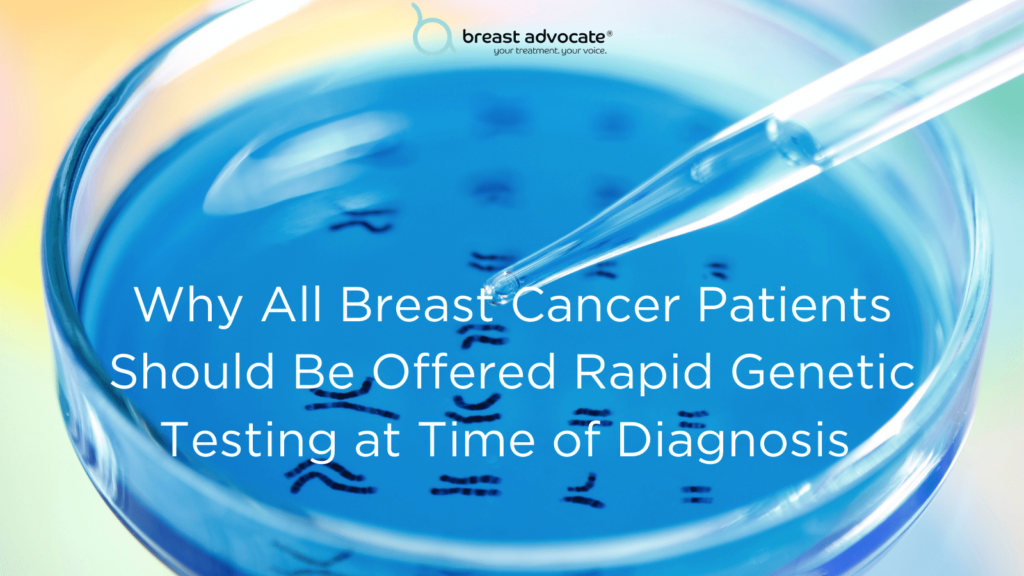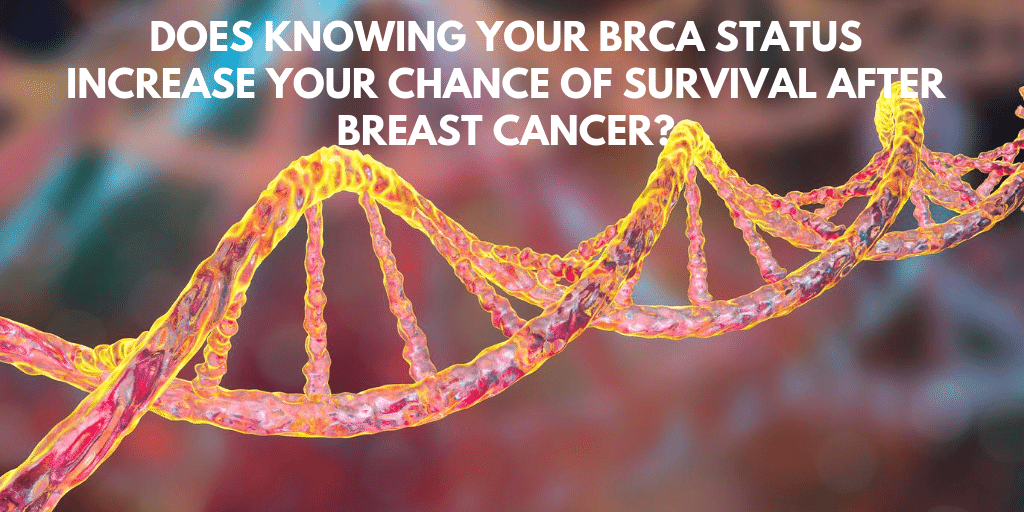Why All Breast Cancer Patients Should Be Offered Rapid Genetic Testing at Time of Diagnosis
A breast cancer diagnosis brings with it a need for many different treatment decisions. One of the first decisions to consider, is which operation to have to remove the tumor. Surgical options include a lumpectomy, oncoplastic surgery, a mastectomy, or even a bilateral mastectomy (removal of bth the cancer breast and healthy breast). Many women, particularly in the US, often find themselves trying to decide between the least invasive approach, a lumpectomy, or the most aggressive, a bilateral mastectomy with or without breast reconstruction.

Factors such as tumor size, breast size, the location of the tumor, and the type of breast cancer can greatly impact which surgery is recommended. Patients should be given all options and discuss the pros and cons of each procedure with their healthcare team to determine which treatment plan best serves their individual needs.
Bilateral Mastectomy Recommended for Patients at High Risk Due to Genetic Mutation
For patients with a genetic mutation (such as a BRCA1 or BRCA2 mutation), who have a much higher risk for developing cancer in the future, the removal of both breasts is usually recommended as it significantly reduces the risk of another breast cancer in the future. Patients can of course opt to save their healthy breast and instead have close follow up including 6-monthly MRIs, and can also take risk-reducing medication like Tamoxifen.
However, not all patients undergo genetic testing prior to breast cancer surgery to even know they are at higher risk of developing another breast cancer in the future.
Rapid Genetic Testing Offers Patients More Insight When Planning Breast Cancer Surgery
A study published in Annals of Surgical Oncology found that women with a recent breast cancer diagnosis who are offered a rapid genetic test, and who received their results prior to their initial breast surgery, oftentimes chose to have a bilateral mastectomy. In the study, more than 1,000 women were offered a rapid genetic test following a breast cancer diagnosis. Of those who tested positive for a BRCA mutation, over 70% chose to have a bilateral mastectomy, with or without reconstruction.
These test results demonstrate the need for further evaluation of the current model of breast cancer care. Currently, not all women with a breast cancer diagnosis are routinely offered genetic testing. Only those who also have a family history of breast cancer, or are very young at the time of diagnosis are typically referred to a genetic counselor for gene testing.
By offering all women the option of a rapid genetic test at the time of diagnosis, patients would be better informed when making surgical treatment planning decisions.
Personalized Treatment Recommendations in the Palm of Your Hand
The Breast Advocate® app is another great resource for patients weighing their options for breast cancer surgery or breast reconstruction.
Co-created by leading specialists and patient advocates, Breast Advocate® is a free breast cancer surgery app that provides ALL your surgical options along with evidence-based recommendations, personalized for you.
Download the free app HERE.
3 New Genetic Mutations Linked to Male Breast Cancer

Our genes determine everything about our bodies. They play a key role in our health and can determine our likelihood of developing diseases. Some genetic mutations significantly increase the risk of developing breast cancer. The most common mutations associated with breast cancer involve the BRCA1 and BRCA2 genes. About 10% of male breast cancers are caused by mutations in the BRCA2 gene. Other examples of mutations that increase the risk of male breast cancer include those found in PTEN, PALB2, CHEK2 and NBN genes.
In addition to these well-recognized gene mutations, other very minor changes to our DNA code (known as single-nucleotide polymorphisms, or SNPs) also influence our risk of developing cancer. Unfortunately, these types of changes in our genetic code are much more common than BRCA gene mutations.
Although most genetic research associated with breast cancer risk is derived from studies in women, newly published findings bring insight on the genetic risks of developing breast cancer in men. A UK study, published in the Journal of the National Cancer Institute looked at the genotypes of 1,380 men diagnosed with breast cancer.
Results revealed that 3 new SNPs were significantly associated with an increased risk of male breast cancer. One of these SNPs is located on chromosome 6 (rs9371545), and two are located on chromosome 11 (rs554219 and rs78540526). These SNPs increase the risk of developing breast cancer in men by about 47%, 45%, and 61% respectively. Consistent with the predominance of ER-positive tumors in men, genetic correlation was strongest between male breast cancer and ER-positive female breast cancer. Although these genetic mutations are also linked to an increased breast cancer risk in women, the 3 new SNP variants have a greater impact on men.
Improved Decision-Making
While there is still a lot of research still needed, these findings can aid in the development of better risk assessment for men. For those choosing to undergo genetic testing, test results can help quantify individual risk and help guide treatment decision-making around risk-reducing options.
“This study, which shows more of a similarity between the genetic causes of the disease in men and women than previously thought, is a major step forward,” shared Dr Simon Vincent, director of research services at Breast Cancer Now. “Our knowledge of breast cancer in men is limited, because male breast cancer is rare which makes it difficult to collect enough tissue or blood samples to research and understand the disease. We now look forward to further research into the shared genetic causes of male breast cancer which could lead to developing risk reducing treatments and interventions to help prevent more cases among those at increased risk in the future.”
Does Knowing Your BRCA Status Increase Your Chances of Survival after a Breast Cancer Diagnosis?
Having a BRCA1 or BRCA2 gene mutation increases your risk of developing breast cancer during your lifetime by up to 80%. There are many reasons why you may choose to have or not have genetic testing. However, new research suggests there is a survival benefit associated with knowing that you carry a BRCA1/2 gene mutation.

A recent JAMA study evaluated the connection between patients’ knowledge of their BRCA gene status, and their overall survival after a breast cancer diagnosis. The study analyzed 105 women with breast cancer between 2005 and 2016. Forty-two women knew they were carriers of a BRCA1 or BRCA2 mutation. Sixty-three women only discovered their BRCA status after they were diagnosed with breast cancer. Both groups of women had a similar age at the time of their breast cancer diagnosis. There were no significant differences in hormone receptor status of the tumors in between groups.
Earlier Stage at Diagnosis and Improved Survival
The study found a significant difference between the two groups of women in terms of the breast cancer stage at the time of diagnosis. In the women who knew they carried a BRCA gene mutation, 80.9% had DCIS or a stage 1 cancer at diagnosis, and only 9.5% had a stage 2 breast cancer or higher at diagnosis. In women who did not know their BRCA status, only 30% had an early stage cancer at diagnosis, whereas 52.4% were diagnosed at stage 2 or higher.
‘Knowledge is Power’
Compared to women who knew their BRCA1 or BRCA2 genetic status prior to their breast cancer diagnosis, women who learned their positive gene status after diagnosis were 12 times more likely to have an advanced stage breast cancer at the time of diagnosis. Likewise, 5 year survival was significantly higher for women who knew their BRCA genetic status prior to their breast cancer diagnosis.
Personal Choice
There are pros and cons to every decision, and deciding whether you should have gene testing is no different. There is no “right” or “wrong” and ultimately the decision is a very personal one. Anyone who is considering gene testing should consult with a gene counsellor first to fully discuss the implications of testing ahead of time. There is no point getting a test if you are not prepared to make a decision based on the results.
This study provides some additional helpful information to consider in your decision-making: women who are aware of their BRCA1/2 status have a greater chance of having an earlier stage breast cancer at the time of their cancer diagnosis and living longer, compared to women who carry a BRCA genetic mutation but are unaware.
USPSTF Expands BRCA Gene Testing But Not Far Enough
The US Preventive Services Task Force (USPSTF) issued a new recommendation statement calling for more patients to receive genetic counseling and genetic testing for BRCA1 and BRCA2 gene mutations.
Often referred to as the “breast cancer gene,” mutations in BRCA1 and BRCA2 genes have been shown to increase the likelihood of an individual developing breast, ovarian, fallopian tube and peritoneal cancer.
To better predict and manage the risk of developing hereditary cancers, the USPSTF is now recommending more patients, including breast, ovarian, fallopian tube and peritoneal cancer survivors, undergo genetic counseling and genetic testing. Previously, the USPSTF only recommended those who had a family history BRCA-related cancers be tested.
The USPSTF statement, published in the JAMA Network, recommends that “primary care clinicians assess women with a personal or family history of breast, ovarian, tubal, or peritoneal cancer or who have an ancestry associated with BRCA1/2 gene mutations with an appropriate brief familial risk assessment tool. Women with a positive result on the risk assessment tool should receive genetic counseling and, if indicated after counseling, genetic testing… The USPSTF recommends against routine risk assessment, genetic counseling, or genetic testing for women whose personal or family history or ancestry is not associated with potentially harmful BRCA1/2 gene mutations.”
Why are these tests important? Expanding testing will potentially help survivors determine which treatments would be best based on their current diagnosis, as well as alert them to treatments that could significantly lower their future cancer risk, such as risk-reducing mastectomy and hysterectomy. It could also be very important and possibly life-saving for some of the survivors’ family members.
While the updated recommendations are very good news, in several ways they do not go far enough: newly diagnosed patients with breast or ovarian cancer, patients with advanced cancers, and men were not included. Men who carry a BRCA gene mutation are at increased risk for breast, pancreatic and prostate cancers, and should also have counseling and testing. As in women, these mutations can be passed on to their children and beyond.
Anyone who is concerned about their future cancer risk and doesn’t fall into these guidelines should consider proactively seeking a consultation with a genetic counselor. You can find a certified genetic counselor near you via the National Society of Genetic Counselors.






